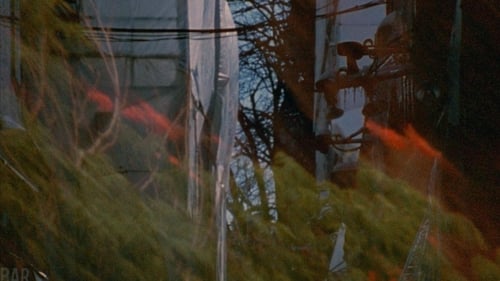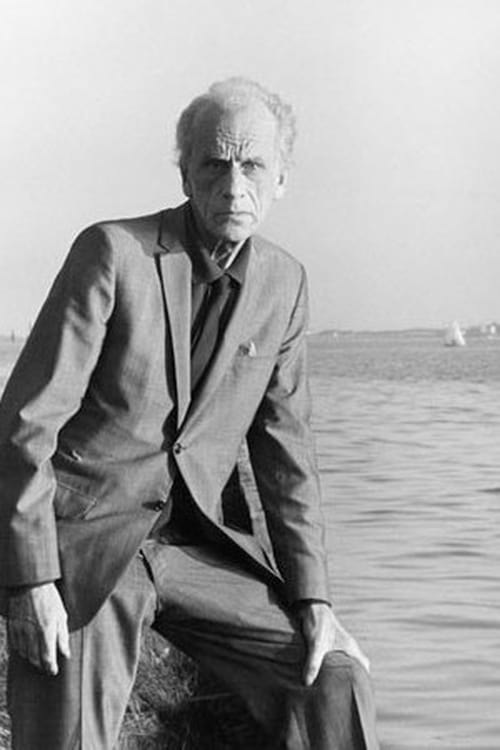By Night with Torch and Spear (1942)
Жанр :
Время выполнения : 8М
Директор : Joseph Cornell
Краткое содержание
Smoke, sparks and steam dance together in Cornell's found-footage collage. Backwards title cards (or an alien language, if you like) punctuate this mishmash of the industrial and the ancient.

A meadow, a lake, the silhouette of a hill, trees. 21 days of the same view in Saarland. 21 days with five different cut-outs in a mask before the camera, which finally reveals a complete panorama. The landscape changes with the advancing seasons and becomes slowly delirious in its technical alienation.

With the screen split asymmetrically, one part in positive, the other negative, the film documents the evolution of simple celled organic forms into chains of cells then more complex images from tribal cultures and contemporary modernist concepts. The images react, interpenetrate, perhaps attack, absorb and separate, until a final symbiosis (or redemption?) is achieved.

A short, avant-garde movie, starring twelve-year-old ballet student Gwen Thomas, Nymphlight is a lovely blend of fact and fiction, using Bryant Park at the New York Public Library as a stage set for the fantasy inclusion of a certain nymph. A meditation on an ephemeral day in the the life of a park shared by birds, the young and the old.

With a similar dreamy mood like its predecessor "Take the 5:10 to Dreamland" (1976) this clip starts with a boy getting into his bed. The camera zooms in into the boy's mind and a slow, sad waltz (i.e."Valse Triste") accompanies images of a locomotive, a miner, the globe, the sky, a sheep heard, etc. Disparate elements, but if one concentrates only at the movement of the figures, one can perceive a commotion, slowly livening up: The starting wheels of the heavy locomotive, the tired miner pushing the heavy cart of coal bricks, the globe smoothly turning around and around, the clouds imperceptibly floating in the sky, the sheep idly moving in the herd, etc. We reach the first climax when a mannequin opens her coat like a flower. The second big crescendo spurts out from a "water hose", after watching schoolgirls doing gymnastics for quite a while. A sad, but nostalgic aftertaste lingers in the end when funeral cars drive away through a flooded area…

The film is a documentary portraying a struggle as man tries to subdue nature. To prevent flooding and for purposes of land reclamation, the people of the Netherlands struggle and succeed in building a breaker, thereby eliminating the wild inland body of water once known as the Zuider Zee (now called Ijsselmeer).

A short film where circus performers entertain children.

A fast-paced rhythmic impression of dancers, musicians and sportsmen at a highlands event.

Intended as a publicity film for Chrysler, Rhythm uses rapid editing to speed up the assembly of a car, synchronizing it to African drum music. The sponsor was horrified by the music and suspicious of the way a worker was shown winking at the camera; although Rhythm won first prize at a New York advertising festival, it was disqualified because Chrysler had never given it a television screening. P. Adams Sitney wrote, “Although his reputation has been sustained by the invention of direct painting on film, Lye deserves equal credit as one of the great masters of montage.” And in Film Culture, Jonas Mekas said to Peter Kubelka, “Have you seen Len Lye’s 50-second automobile commercial? Nothing happens there…except that it’s filled with some kind of secret action of cinema.” - Harvard Film Archive

Starting in the late 1930s, illustrator and experimental animator Douglass Crockwell created a series of short abstract animated films at his home in Glen Falls, New York. The films offered Crockwell a chance to experiment with various unorthodox animation techniques such as adding and removing non-drying paint on glass frame-by-frame, squeezing paint between two sheets of glass, and finger painting. The individual films created over a nine-year period were then stitched together for presentation, forming a nonsensical relationship that only highlights the abstract qualities of the images. —Kansas City Electronic Music and Arts Alliance

It is one of the most stirring animated films in the history of animation. In a simple, but powerful way Czekala presents a horror that happened in concentration camps – prisoners’ dread, humiliation and lost humanity. The everyday roll-call ends tragically because of prisoners’ “insubordination” in this black and white film. The Roll-Call crossed borders of what can be presented or not in animation. It is sometimes interpreted as a response to the trend of allegorical and philosophical films that dominated in Polish animation in 1960s.

Le P'tite Lili is a short film directed by Alberto Cavalcanti in 1927. This is a visual illustration of a song, The Lady of gravel and Benech Lilie, with music for the audio version of 1930 by Darius Milhaud. Only one original copy of this tragic story and impressionistic. The film tells the story of Lili ( Frau Catherine Hessling ), a 16 year old orphan who has lost her whole family but has retained her purity and innocence. Alas, a terrible doom awaits this optimistic child: in the slums of Paris she will meet a man who will lead her into prostitution.

A man talks about heroin abuse and withdrawal.

One of the few Brakhage films featuring spoken dialogue and a central character, this sly and bitter polemic pits an actor (poet? director?) against an unseen audience.

Two Penny Magic (Zweigroschenzauber) starting off with a little magic trick. It then presents an array of images from swimmers, bicyclers, murderers, airplanes in flight, boxers, lovers, runners, becoming in the end a collection of images in a magazine.

Hand-painted 35 mm stock photographed in 16 mm, color, 3:20 or 10 min. Reportedly cut down from about 30 min. Initially intended to be screened with and synchronized to Dizzy Gillespie's Guarachi Guaro or Manteca. "Batiked animation made of dead squares...".

“This film is against the corporate military industrial structure of global village.”

Serene Velocity stares down the center of an empty institutional hallway while shifting the focal length of a stationary zoom lens, transforming the basement corridor into a nexus of visual and conceptual energy.

A short film by Stan Brakhage featuring music by Rick Corrigan.

Conceivably the best of all of Breer’s films to date – has more to do with figuration, according to Breer’s formulation regarding titles with letters or numbers. This becomes clear right away as the title letters are intercut with a flurry of fish swimming past the frame lines, which are made all the more literal through the associative chain established by a snippet of Schubert’s Trout Quintet heard on the soundtrack, along with footsteps – which continue over a profusion of other shapes, colors, and objects, including the title letters again. -- Jonathan Rosenbaum

This meditation takes its visual imperatives from the occasion of Mesa Verde.




